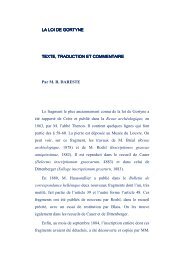CYPRIOT GRAMMAR
CYPRIOT GRAMMAR
CYPRIOT GRAMMAR
You also want an ePaper? Increase the reach of your titles
YUMPU automatically turns print PDFs into web optimized ePapers that Google loves.
Συγυρίζω -> συγύριση = συργύρισμαν<br />
Συχχωρω -> συχχώρεση = συχχώρημαν<br />
Στάσσω -> στάξη = στάξιμον<br />
Σταύρωννω -> στάυρωση = στάυρωμαν<br />
Στερεώννω -> στερέωση = στερέωμαν<br />
Τηανίζω -> τηάνιση = τηάνισμαν<br />
Φέγγω -> φέξη = φέτζ’ίσμαν<br />
Φωτίζω -> φώτιση = φώτισμαν<br />
Χάννω -> χάση = χάσιμον<br />
Χαράσσω -> χάραξη = χάραμμαν<br />
Χογλάζω -> χόγλαση = χόγλασμαν<br />
Χωνεύκω -> χώνεψη = χώνεμμαν<br />
45.6 Verbal Nouns and Infinitives in –ειν/-είν<br />
In Cypriot there are many verbs which also have the Verbal Noun and Infinitive ending in –ει/-είν. Theoretically all verbs can simply drop<br />
there –ω/-ώ ending and have it replaced with –ειν/–είν correspondingly which produces the Action Noun and the Infinitive for those Verbs.<br />
However it is no longer the usual case with people. However the verbs below are the ones which follow this rule and are frequent.<br />
Θκιανείν (the walking around), Λέειν (the saying), μασείν (the chewing), ξείν (the scratching), πατείν (the walking/stepping), φιλείν (the<br />
kissing), βαφτίσειν (the christening), γαμήσειν (the fucking), καθίσειν (the sitting), μεθύσειν (the getting drunk), μοιράσειν (the sharing),<br />
πετάσειν (the flying), ρέσειν (the), τζοιμήσειν (the sleeping), χουμίσειν (the boasting), χαρτώσειν (the getting enganged), δείν (the seeing),<br />
πείν (the telling), πκιείν (the drinking), φαείν (the eating), στραφείν (the returning).<br />
45.7 Verbal Adjectives<br />
There is a considerable number of verbs in Cypriot which produce nouns which at the same time can also function as adverbs (they are<br />
changed for gender accordingly). There is no rule of formation but merely the existence of these verbal adjectives. Thus I can do nothing<br />
more than to simply list them here for the enrichment of your vocabulary.<br />
-ητός<br />
βουρητός (running), κολλητός (stuck), παρπατητός (walking), φορητός (portable), στητός (standing), τραβητός (pulling/pulled), χτυπητός<br />
(hitten)<br />
-στός<br />
σβηστός (turned off), τραουηστός (sung/singing), τζ’οιμηστός (sleeping), χωστός (hidden).<br />
-ιστός<br />
Καθιστός (sat down), σ’ιστός (torn/rushing), χωριστός (divided/separated), τηανιστός (fried), σφοντζ’ιστός (wiped), σφραϊστός (sealed).<br />
-αστός<br />
πολογιαστός (sent away), βραστός (warm), χογλαστός (boiling), ταιρκαστός (matching).<br />
-αφτός<br />
καφτός (burning), βαφτός (painted), κρυφτός (hidden/quietened), αγραφτός (unwritten), σ’υφτός (bowed down), άνιφτος (with un<br />
unwashed face).<br />
-αχτός<br />
μαλαχτός (soft), αντιναχτός (explown), πεταχτός (springing), ανοιχτός (open), ανάνοιχτός (unopened).<br />
-ωτός<br />
ξαπλωτός (laid down), μουλλωτός (quietened/shut up), στρωτός (spread over), πιντωτός (shoved in), βουλλωτός (plucked in), σηκωτός<br />
(lifted up), σταυρωτός (crossed).<br />
45.8 Negation for Verbal Adjectives<br />
In this last section of this Chapter we will have a brief look on how to negate adjectives. The corresponding feature in English is done by<br />
placing the prefix un- to the adjective. Examples: happy -> unhappy, lucky –> unlucky.<br />
In Cypriot this prefix is α- and it added to almost all adjectives ending in –τος. For adjectives in –τος but who also start<br />
with a vowel use the prefix ανά-. The tone mark is always placed in the third to last syllable.<br />
Ανοιχτός -> ανάνοιχτος<br />
Αντιναχτός -> ατίναχτος<br />
Βραστός -> άβραστος<br />
Καθιστός -> ακάθιστος<br />
168





